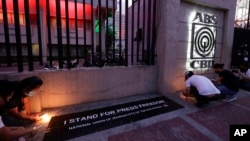The Philippines' telecoms regulator has awarded television frequencies held by former top broadcaster ABS-CBN Corp to firms run by two allies of
President Rodrigo Duterte, a move critics warned could undermine media freedom.
Shares in ABS-CBN sank 10% on Wednesday, its biggest daily decline in 18 months, after the National Telecommunications Commission (NTC) announced the transfer of ABS-CBN's assets to other media entities.
The announcement was the latest in a series of setbacks for ABS-CBN, whose franchise extension Duterte threatened repeatedly to block.
In 2020, a lower house dominated by the president's allies rejected the renewal of ABS-CBN's 25-year license, alarming media freedom groups.
The regulator on Tuesday said it had allowed a firm controlled by billionaire politician and businessman Manuel Villar, a Duterte supporter whose son served in the cabinet, to operate two assets previously held by ABS-CBN.
On Wednesday, NTC awarded another ABS-CBN-held frequency to a media company owned by influential evangelist and Apollo Quiboloy, Duterte's longtime friend and spiritual adviser, whose church group has six million members.
Another channel was awarded to a domestic media group.
NTC said the companies were next in line for the channels, having applied back in 2006 and 2007.
However, Marichu Lambino, lawyer and mass communication professor at the University of the Philippines, said the NTC might have committed errors in assigning the assets and reviving old applications.
Vergel Santos, a journalist, commentator and trustee of media watchdog Center for Media Freedom and Responsibility, said the channels were rewards for loyalty to Duterte, and clear conflicts of interest.
"It's difficult to believe that the Villars and the self-styled evangelist Apollo Quiboloy got their broadcast franchises other than as a favour from President Duterte, given their long and open symbiotic relationship."
Villar's camp declined to comment, while Duterte's office, Quiboloy's group and ABS-CBN did not immediately respond to requests for comment.
ABS-CBN, which carries in-depth news coverage, is among several media groups that have angered Duterte and later experienced legal or licensing problems. Duterte's office has repeatedly denied his involvement.
His hostility towards ABS-CBN stems from its initial failure to reimburse him for paid election campaign commercials that it decided not to air. It has since apologized and refunded
Duterte.
After the loss of its franchise, ABS-CBN had to cut jobs and stop its free-to-air television and radio shows watched by tens of millions of Filipinos.
Since then, ABS-CBN has turned to buying airtime from other television networks and broadcasting online.





